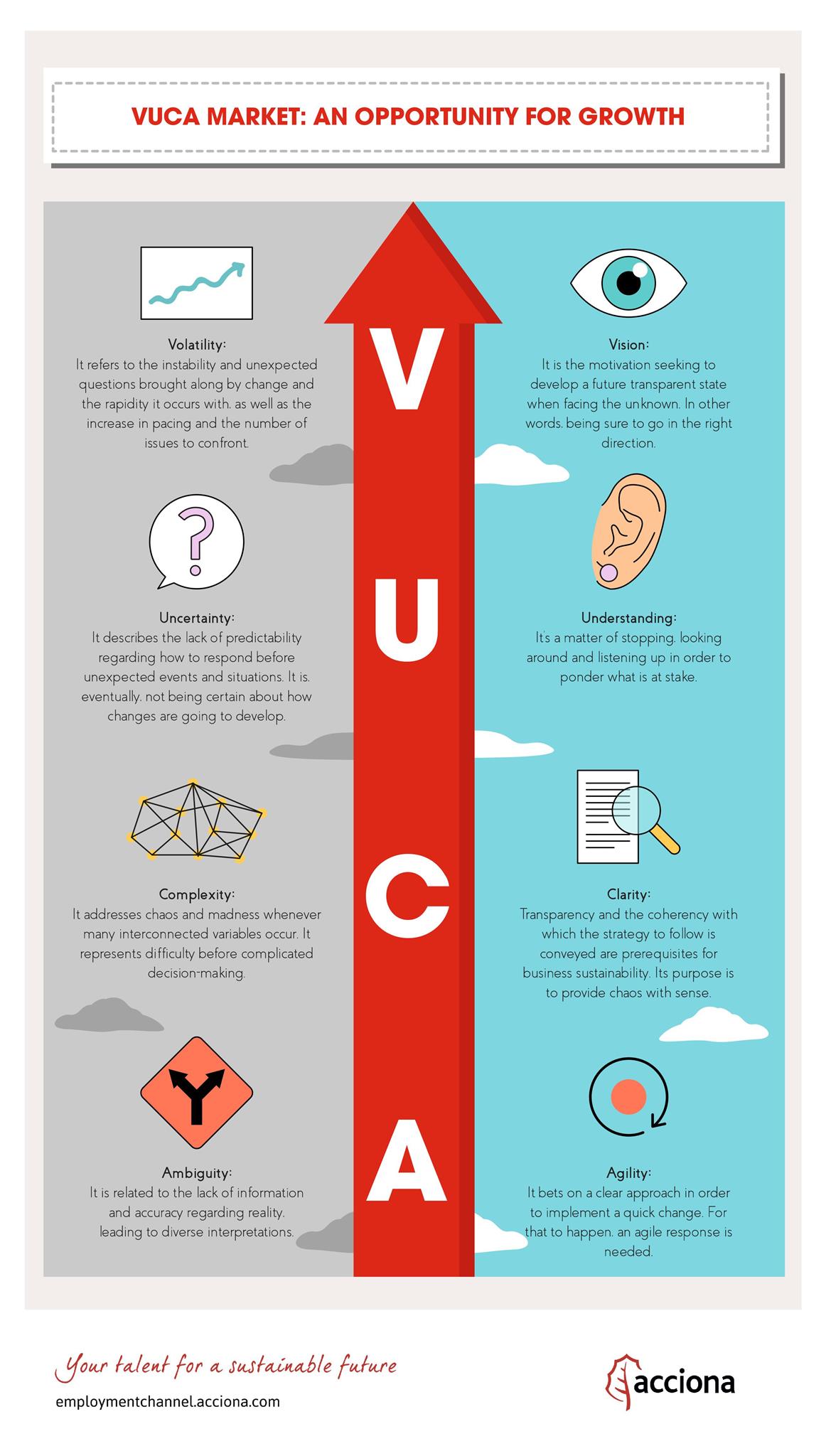Most professionals and companies find it difficult to make changes and adapt to new situations and diverse ways of thinking. Attachment to planning makes it complicated to leave old beliefs and habits behind in order to embrace new ones in accordance with prevailing circumstances. In this context, VUCA markets (Volatile, Uncertain, Complex and Ambiguous) have settled into our society to provide radically different working methods and scenarios in contrast to those previously in existence.
The acronym VUCA was first introduced by U.S. Army, as a military and geopolitical term, to define the world after the collapse of the Communist bloc at the beginning of the 1990s. Nowadays, it is used in the field of business strategy and management, since the reality brought along by the 2008 economic crises became less predictable and full of changes, doubts and conflicts. This had an overall impact on our lives, professional performance and resource and people management strategies.
Instead of a threat or a curb, however, the current uncertainty prevailing over labour markets should be seen as an opportunity for improvement, growth and development for both employees and organizations. Although the term VUCA is synonym to a fast-paced, crazy, ever-changing world full of obstacles, this situation can always be exploited to face professional challenges in a quicker, more agile way.
Agile Management
Nevertheless, organizations that put management agility into practice become aware that planning becomes senseless, since trying to foresee what’s going to happen tomorrow is more of an exercise in clairvoyance and, to a certain extent, it entails a huge waste of time.
In a traditional structure, people wait for instructions on what to do and how. These are individuals with little to no autonomy. In VUCA environments, instead, there’s a process of evolution and maturing leading to the substitution of control for monitoring. In other words, people are expected to work autonomously and responsibly, assuming compromises and consequences, therefore transforming that control into feedback management.
Thus, we could say that we have transitioned from an industrial economy to one based on knowledge, where employees become the foundation of organizations and Employer Branding would be the differentiating factor to attract the most talented.
For that reason, the steps that companies must follow in order to operate successfully in VUCA environments require recruiting a dynamic leader, as well as promoting the development of those managers already in the company, fostering an organizational culture and building up active employees’ loyalty.

Flexibility and adaptation: necessary skills of a VUCA leader
Being able to make decisions and implement them, solve problems and manage results, as well as having the capability of staying focused while navigating in uncertainty, are among those essential skills leaders need in a quick-changing business environment. Undoubtedly, flexibility and adaptation are the main virtues required to confront changes in VUCA markets so as to achieve success in business management, without fear of anxiety or sloth.
Nowadays, executive management is exposed to constant pressure, requirements and expectations that are very hard to meet. The demand of challenges before a relentless flow of information is increasing and takes many different directions, making it necessary to find some kind of compass to guide themselves and help their collaborators, who may be also under those same constraints.
No matter how well-prepared a leader may be, reaching perfection is almost impossible. That’s why it is important to be aware of own limitations and be capable of working around people who can provide value and further knowledge in those fields where it’s necessary. Experience is a rank in these cases, although in VUCA environments flexibility and continuous training are also essential. After all, those who adapt better to changes are the ones who thrive eventually. And that is equally pertaining to all levels inside the organization.
Likewise, and assuming that nobody is able to find the best solution single-handedly, the more minds contributing to solve a problem, the better for all parties involved. That’s why humbleness and authenticity, along with soundness and integrity, are essential and profitable qualities in this kind of environments. Also, innovation and coherence, since the best ideas are always waiting in the wings for professionals with new perspectives to be carried out successfully.
Some other desirable skills in order to manage oneself inside the world of VUCA are emotional intelligence, independent learning, personal initiative, creativity, teamwork, active listening, strategic thinking and the command of state-of-the-art technological tools.
Finally, professionals must focus on what’s achievable instead of being limited to what’s probable; that is, they must be sensitive to anything that may occur and not just concentrated on what is known.
Limitations = opportunities
Transforming limitations into opportunities is the best way to anticipate changes entailed by VUCA environments in order to provide a suitable response to new markets. In fact, according to the international consultant Charles-Edouard Boueé, the answer would lie in building up a versatile, “light footprint” corporation, based on organization, innovation and willingness. To sum up, the key to success would lie in managing knowledge inside an agile and flexible company.
Sources: Cerem, Glocal Thinking, El Economista, Charles-Edouard Bouée


